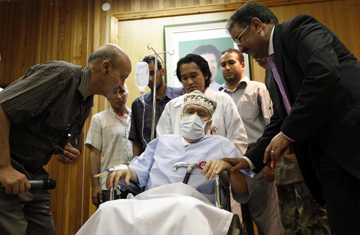
Abdel Basset Ali al-Megrahi sits in a wheelchair in his hospital room in Tripoli on Sept. 9, 2009
When Lockerbie bomber Abdel Basset Ali al-Megrahi was released from Scottish prison in August 2009, David Cameron, then Britain's opposition Conservative Party leader, publicly stated that he thought the move was "wrong." Now the issue has come back to haunt Cameron in his role as Britain's new Prime Minister, with BP admitting last week that it had pushed to speed up a prisoner transfer deal with Libya — which included al-Megrahi — and U.K. politicians branding the decision to free the Libyan a "mistake." As the issue threatens to cast a shadow over the Prime Minister's first official visit to the White House on Tuesday, July 20, Cameron finds himself having to remind people that he was against the release from the start.
Speaking to the BBC on Monday, Cameron declared, "All I know is, as leader of the opposition, I could not have been more clear that I thought the decision to release al-Megrahi was completely and utterly wrong." Scottish officials said last year that the decision to free the only person convicted of bombing Pan Am Flight 103 over Lockerbie in 1988, killing 270 people in the process, was made on compassionate grounds — his prostate cancer, doctors said, would kill him within three months. Al-Megrahi returned to Libya to a hero's welcome, sparking outrage in the U.S. Eleven months on, he's still alive.
The furor surrounding al-Megrahi's freedom had died down until beleaguered oil giant BP brought it bubbling to the surface again last week. On July 15, the company admitted it had approached the previous Labour government with concerns that the delay in the Libyan prisoner transfer deal could have a "negative impact on U.K. commercial interests."
Although both BP and the Scottish government say the oil firm had no involvement in the release negotiations — and that it never mentioned al-Megrahi by name — BP's statement is seen by critics as further evidence of claims that it was a 2007 "deal in the desert" between Labour Prime Minister Tony Blair and Libyan leader Muammar Gaddafi that secured al-Megrahi's freedom in return for lucrative contracts like BP's $900 million exploration contract. Former U.S. ambassador to the U.N. John Bolton told the BBC on Friday that the "outrageous decision" was clearly linked to oil deals with Libya and that leaders in London at the time could have overruled the devolved Scottish government.
British officials have always rejected the allegations surrounding the release, with ministers insisting that the decision was made only by the Scottish government. British Foreign Secretary William Hague wrote to U.S. Secretary of State Hillary Clinton on Saturday, after she had suggested during an earlier phone call that the British government might like to explain the circumstances surrounding the release. In his letter, a copy of which was sent to committee chair John Kerry, Hague said, "While we disagree with the decision to release Megrahi, we must respect the legal and constitutional independence of the process that the Scottish executive [government] followed. The decision to release Megrahi, as a prisoner in Scotland, was solely for the Scottish executive to take."
Hague said there was "no evidence" that BP had been involved in the Scottish executive's decision or that the executive decided to release al-Megrahi in order to facilitate oil deals for BP. "BP made no representations to the Scottish government," a spokesman for the executive tells TIME. "Mr. Megrahi was released on compassionate grounds alone. He was sent home to die according to the due process of Scots law, based on the medical report of the Scottish prison service director of health and care and the recommendations of the parole board and prison governor."
However, the U.S. Senate Foreign Relations Committee has said it plans to launch a hearing on July 29 into the allegations of BP's lobbying for al-Megrahi's release, with suggestions it might call Blair as a witness.
Cameron will be hoping that his statement Monday morning will finally draw a line under the issue. But that seems unlikely, with the topic threatening to dominate his first official U.S. visit. In many of his meetings with President Barack Obama and various members of Congress, Cameron could find himself doing three things over and over again: explaining the controversial decision, reiterating that he opposed the release from the beginning and defending BP's already battered reputation.
